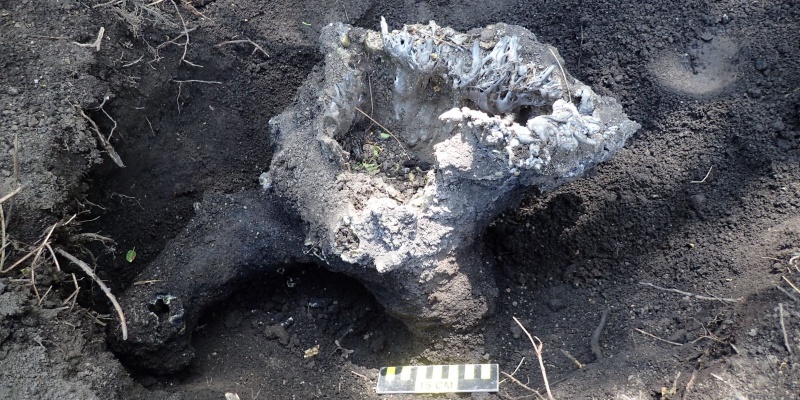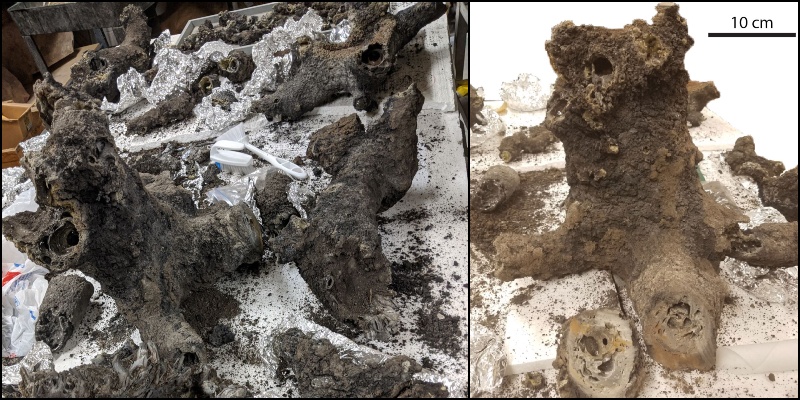Lightning Strikes Helped Life get an Early Start on Earth
By Scott Alan Johnston
So, you want to create life? You’re going to need some ingredients first. On Earth four billion years ago, you might find some of those ingredients in the impact craters of asteroid strikes (as long as you don’t get blown up in the blast yourself). A safer place to look, according to new research from the University of Leeds, might be in the sites of lightning strikes. Lighting is less destructive, more common, and creates equally useful minerals out of which you can build your early, single cellular life forms.
The study, published this week in Nature Communications, focuses on the element phosphorus, which, alongside carbon, hydrogen, nitrogen, oxygen, and sulfur, is one of the six most important building blocks of life. On Earth, phosphorus is hard to find in a useable form, because “it is bound in minerals such as apatite, which are effectively insoluble in water.” But useable phosphorus can be created by meteorite impacts “in the form of the mineral schreibersite, [which] has been found to be highly reactive,” the paper suggests. Schreibersite’s unique ability to dissolve in water makes it very useful for creating organic molecules, and it likely played a key role in the creation of early life forms.
Meteorites aren’t the only way to get schreibersite. It can also be made by lightning, as lead author Benjamin Hess discovered. Hess made the discovery while studying a fulgurite (a rock produced by a lighting strike) found in Glen Ellyn, Illinois in 2016. Upon carefully examining the fulgurite, he realized it contained an unexpectedly large amount of schreibersite.

The implications of this discovery are significant not just for understanding the origins of life on Earth, but also for calculating the possibility of life elsewhere in the Universe. As I wrote earlier this week, most of the asteroid strikes in Earth’s history occurred all at once, during a cataclysmic event known as the Late Heavy Bombardment between 4.1 and 3.8 billion years ago, after which asteroid strikes in the inner Solar System became a rare event. If this is true in other solar systems too, then phosphorus from asteroids can only be obtained early on, during a planet’s formative period of bombardment. Life would have to form early, or miss its chance to thrive.
“Lightning, on the other hand, is not such a one-off event,” as Hess’ mentor, Jason Harvey, explains. “If atmospheric conditions are favorable for the generation of lightning, elements essential to the formation of life can be delivered to the surface of a planet. This could mean that life could emerge on Earth-like planets at any point in time.”
Lightning’s ability to produce schreibersite greatly expands the chances life has to develop over the course of a planet’s history, and it might mean that life is more common in the Universe than we thought. Lightning also has the added benefit of being less destructive than a meteor, making it less likely to disrupt the evolution of early microbes.

Scientists still don’t know exactly how abiogenesis – the process of making life from non-living matter – happened. But this new research makes it clear that phosphorus, one of the rarer ingredients required for it to happen, was readily available on Earth in a useable form much longer than we thought. Next time you’re caught in a thunderstorm, remember you’re witnessing the planet seed itself with useable phosphorus for organisms like us, and our microbial ancestors, to enjoy.
Hess is now a PhD student at Yale University. Sandra Piazolo of the University of Leeds also contributed to the paper as a mentor, alongside Harvey.
Learn More:
- University of Leeds, “Lightning strikes played vital role in origins of life on Earth.”
- Benjamin L. Hess, Sandra Piazolo & Jason Harvey, “Lightning strikes as a major facilitator of prebiotic phosphorus reduction on early Earth.” Nature Communications.
Featured Image Credit: Lucy Entwisle
The post Lightning Strikes Helped Life get an Early Start on Earth appeared first on Universe Today.

March 18, 2021 at 11:54PM
via Universe Today read more...

Post a Comment